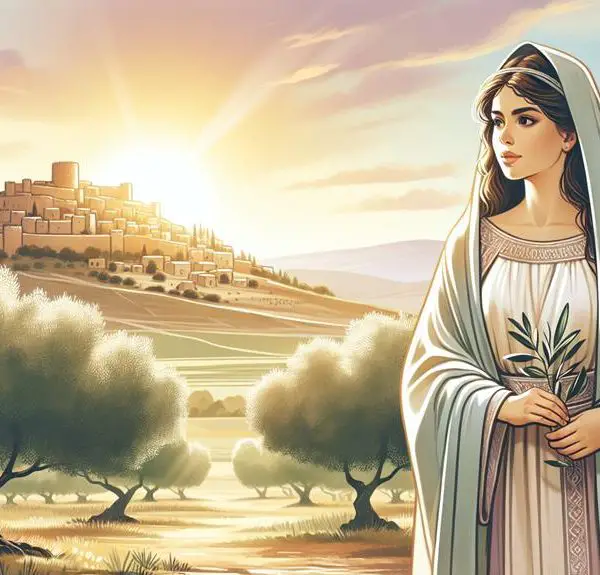Biblical symbolism of the number 14 unveils deep connections in genealogy and prophecy, inviting exploration into its mysterious significance.

What Is the Significance of 14 in the Bible
In the tapestry of biblical narratives, the number 14 has woven itself into several corners, quietly carrying a weight of significance you might not initially appreciate. You'll find it highlighting genealogical milestones, marking moments of deliverance like Passover, and even in the life and times of King Hezekiah.
Its spiritual symbolism and role in apocalyptic visions add layers to its mystique. As you explore this topic, consider how these instances of 14 may not just be coincidental but could offer deeper insights into the text's structure and the messages it aims to convey. This journey might just change the way you view numerical patterns in sacred texts.
Key Takeaways
- The number 14 symbolizes divine providence and the completeness of God's creation in biblical narratives.
- It connects significant biblical figures and events, highlighting cycles of deliverance and redemption.
- In the context of Passover, 14 represents liberation, underscoring the importance of divine intervention and faith.
- Its appearance in apocalyptic visions and numerological studies adds depth to the understanding of eschatological texts.
Genealogical Significance

In analyzing the genealogical significance of the number 14 in the Bible, it's crucial to note its repeated appearance in the generations outlined in the Gospel of Matthew, underscoring a pattern that connects pivotal figures across biblical history. This numerical motif isn't merely coincidental; it serves as a deliberate structuring element, weaving together the narratives of David's descendants and the Babylonian exile, thereby framing the Messiah's lineage within a meticulously crafted historical and theological context.
The division into three sets of 14 generations, from Abraham to David, from David to the Babylonian exile, and from the exile to Jesus, isn't just a mnemonic device. It highlights the role of divine providence in guiding Israel's history through periods of prosperity, decline, and restoration. The emphasis on David's descendants underscores their central role in fulfilling the promises of an eternal kingdom, a motif that reaches its culmination in the New Testament's portrayal of Jesus as the promised Davidic Messiah.
Furthermore, the reference to the Babylonian exile serves as a pivotal moment in Israel's history, a time of judgment but also of hope for restoration. By linking this event to the genealogy of Jesus, Matthew's Gospel suggests that the coming of the Messiah represents a new exodus, a deliverance not just from physical bondage but from the spiritual exile of sin and death.
This intricate numerical and thematic patterning invites you to delve deeper into the text, recognizing the genealogy not as a dry list of names but as a rich tapestry of salvation history, pointing to Jesus as the fulfillment of God's covenant promises.
Passover and Deliverance

Delving into the theme of Passover and Deliverance, it's essential to recognize how this pivotal event not only commemorates Israel's liberation from Egyptian bondage but also symbolizes the broader spiritual emancipation that threads through biblical narratives. The Exodus narrative, vivid with imagery of plagues and Pharaoh's defiance, culminates in this moment of profound liberation. It's a story that doesn't just recount a historical moment but invites you to ponder deeper truths about freedom, faith, and divine intervention.
To deepen your understanding, consider these three aspects:
- Symbolism of the Passover Lamb: The unblemished lamb, whose blood marked the Israelites' doors and spared their firstborn from the final plague, prefigures the concept of sacrifice and redemption. This act of faith and obedience is a cornerstone of the narrative, highlighting the importance of divine deliverance.
- Pharaoh's Defiance: Each plague can be seen as a direct challenge to Pharaoh's stubbornness and the gods of Egypt. This escalating conflict showcases the power struggle between human arrogance and divine will, emphasizing the theme of liberation from oppression.
- Spiritual Emancipation: Beyond the physical liberation from Egyptian slavery, the Exodus story reflects a journey towards spiritual freedom. It symbolizes the breaking of chains from sin and mortality, pointing towards a promised land of spiritual renewal and closeness with God.
King Hezekiah's Life

Shifting focus to King Hezekiah's life, we observe another profound example of faith and divine intervention in biblical history. Hezekiah's reign is notably marked by his religious reforms and the miraculous deliverance of Jerusalem from the Assyrian siege. Analyzing Hezekiah's reforms, it's evident he was determined to restore the worship of Yahweh, diverging from his father Ahaz's idolatrous practices. He reopens the temple, purges Judah of idolatry, and reinstates the Passover celebration. These actions not only reaffirm the covenant between Yahweh and His people but also reinforce the centrality of faith in overcoming adversity.
The Assyrian siege of Jerusalem, a pivotal moment in Hezekiah's rule, further exemplifies the theme of divine intervention. Faced with the formidable Assyrian army, Hezekiah doesn't succumb to despair but turns to prayer and seeks the counsel of the prophet Isaiah. The biblical account of this siege ends with a miraculous deliverance—185,000 Assyrian soldiers are found dead, and Jerusalem remains unscathed. This event isn't just a military victory; it's a testament to the power of faith and the providence of God.
Hezekiah's life, when analyzed, offers profound insights into the dynamics of faith, leadership, and divine intervention. His reforms demonstrate a commitment to spiritual integrity, while the miraculous escape from the Assyrian siege underscores the belief in a God who actively intervenes in the affairs of His people. Through Hezekiah's narrative, we're reminded of the enduring power of faith and the significance of divine guidance in navigating challenges.
Spiritual Symbolism

Exploring the realm of spiritual symbolism, you'll find that numbers often carry profound meanings, shaping the narrative and theological underpinnings of biblical texts. The number 14 is no exception, serving as a symbol that intertwines divine creation and human rebellion, presenting a complex tapestry of faith, judgment, and redemption.
Here are three aspects where the number 14 reveals its spiritual symbolism:
- Divine Creation: The number 14 represents divine creation in several biblical contexts. It's intricately linked with the notion of completeness and perfection, which are attributes often ascribed to God's creation. This connection underscores the belief that the universe and all within it were crafted with intention and precision, reflecting the Creator's omnipotence and omniscience.
- Human Rebellion: Conversely, 14 also symbolizes the complexity of human rebellion against divine will. This duality serves as a reminder of humanity's propensity to stray from the path of righteousness, despite being created in the image of perfection. It's a poignant commentary on the perpetual struggle between flesh and spirit, highlighting the need for divine intervention and grace.
- Cycles of Deliverance: The number's appearance in genealogical records and significant events points to cycles of deliverance and redemption, further emphasizing the interplay between divine providence and human action. These cycles serve as testament to the enduring hope of restoration, even amidst the darkest moments of human rebellion and failure.
In analyzing the spiritual symbolism of 14, you're invited to reflect on the intricate dance between divine creation and human rebellion, a narrative that spans the breadth of biblical history and theology.
Apocalyptic Visions

Building on the spiritual symbolism of the number 14, the Bible's apocalyptic visions offer a deeper layer of meaning, where numbers continue to play a crucial role in unveiling the mysteries of the end times. These visions, rich with symbolic numbers, serve as a codex for understanding the culmination of human history and divine intervention.
In the realm of biblical prophecy, symbolic numbers aren't merely coincidental; they're deeply embedded in the narrative structure and thematic elements of the scriptures. The Book of Revelation, a cornerstone for end times prophecy, is replete with numerological significance that scholars and theologians have studied for centuries. Within its passages, numbers such as 7, 12, and 14 aren't arbitrary. They symbolize completion, perfection, and God's providential completeness, respectively.
You'll find that the interpretation of these numbers isn't straightforward. It demands a nuanced understanding of biblical contexts, a grasp of the original languages, and an appreciation for the symbolic universe the biblical authors inhabited. For instance, the number 14, beyond its surface-level appearances, may hint at a doubled perfection or completion, evoking the dual aspects of God's plan for redemption and judgment.
Delving into the apocalyptic visions, you're invited to view the tapestry of end times prophecy not as a linear narrative but as a complex, interwoven series of symbolic messages, each number a thread contributing to the greater picture. Understanding the role of symbolic numbers, including 14, enriches our comprehension of these eschatological texts, offering insights into the divine orchestration of history's finale.
Frequently Asked Questions
How Has the Number 14 Influenced Christian Liturgical Practices Outside of Passover Celebrations?
You'll find the number 14's influence extends beyond Passover, notably through biblical numerology. It symbolizes divine perfection and completion, evident in the fourteen generations mentioned in the Gospel of Matthew.
This concept has subtly shaped Christian liturgical practices, guiding the structure and timing of certain celebrations. By understanding fourteen's symbolic significance, you gain insight into its role in shaping Christian rituals, reflecting a deeper interpretative layer of biblical tradition and liturgical development.
Are There Any Differences in the Interpretation of the Number 14 Between Various Christian Denominations?
Yes, you'll find that interpretations of the number 14 can vary among Christian denominations, much like how shadows differ in length at various times of the day, yet all originate from the same source.
This divergence in understanding is deeply rooted in generational symbolism and numerical theology, highlighting an analytical, scholarly exploration of biblical numerology.
Each tradition examines the number 14 through a unique lens, reflecting variances in doctrinal teachings and liturgical practices.
How Is the Number 14 Represented or Used in Contemporary Christian Art or Iconography?
In contemporary Christian art, the number 14 carries rich artistic symbolism. Modern interpretations often weave this number into visual narratives, reflecting themes of deliverance and covenant. Artists skillfully embed this symbolism within compositions, inviting viewers to delve deeper into the spiritual significance.
Through this lens, the number isn't just a numeral but a bridge to layered meanings, embodying theological concepts that resonate across denominations and historical contexts.
Can the Significance of the Number 14 Be Found in Any Christian Hymns or Religious Music Compositions?
Interestingly, musical numerology often embeds numbers like 14 to convey deeper meanings.
In exploring hymn symbolism, you'll find that the significance of 14 in religious music compositions isn't overt but subtly woven through musical phrases and lyrical narratives.
This approach enriches the interpretative experience, encouraging a scholarly analysis beyond the surface.
It's a testament to how composers use numbers to craft a multi-layered spiritual dialogue within their works.
What Role Does the Number 14 Play in the Architecture of Churches or Other Religious Buildings?
In exploring the role of the number 14 in the architecture of religious buildings, you'll find that numerical symbolism deeply influences architectural design. This number may not always be overtly visible, but its significance can be subtly integrated through dimensions or structural elements that reflect its symbolic meaning.
This approach showcases how architects embed spiritual numerology within the spatial experience, inviting a more profound interpretation and connection to the sacred.
Conclusion
In the tapestry of biblical narrative, the number 14 threads through with profound significance. It's not merely a numeral but a beacon, illuminating paths from genealogical roots to eschatological visions.
Like a lighthouse guiding ships through stormy seas, 14 signals moments of deliverance and divine intervention. In its essence, it embodies a spiritual journey—marking periods of trial, triumph, and transformation.
Thus, 14 stands as a testament to the intricate design and deep, underlying purpose woven into the fabric of sacred scripture.



Sign up